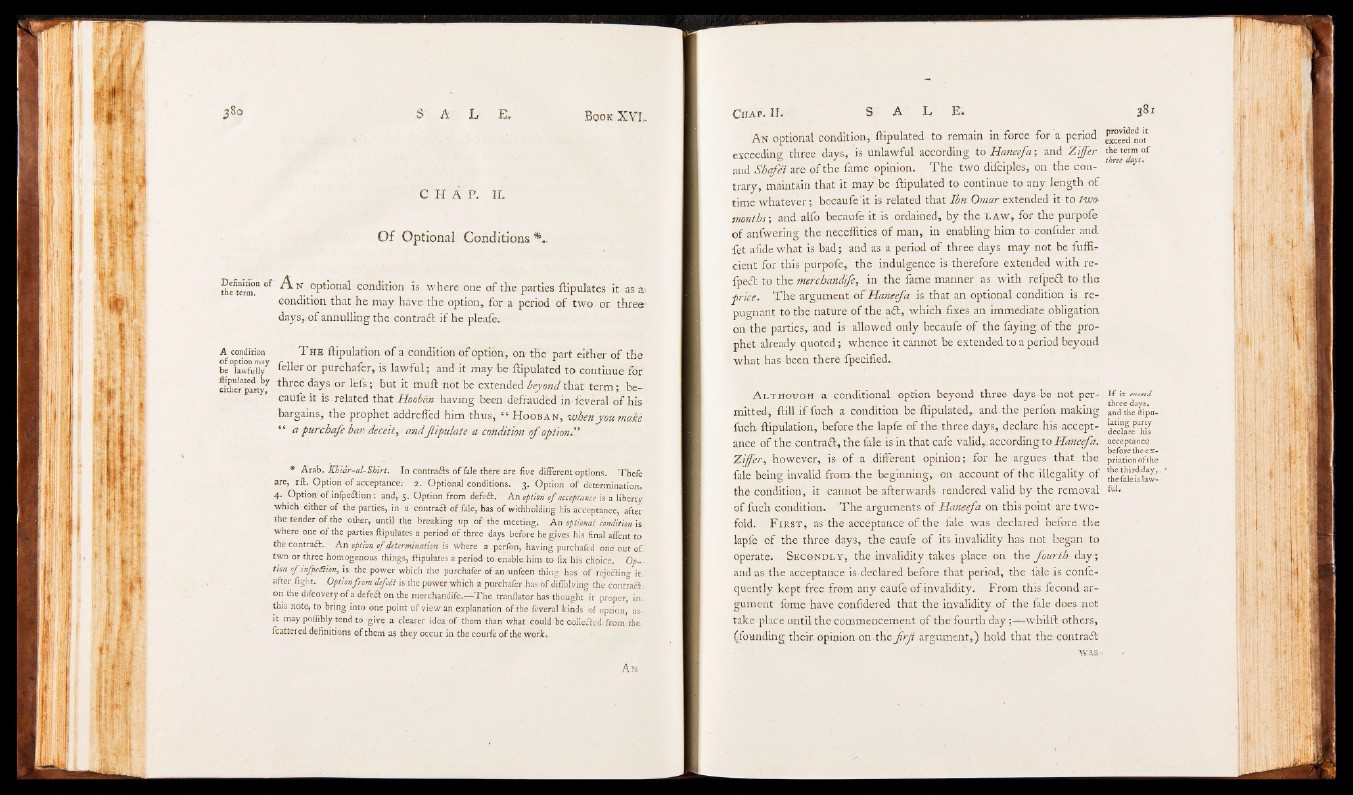
C H A P . ir.
Of Optional Conditions
°f ^ N °Pti°nal condition is where one of the parties ftipulates it as a-
condition that he may have the option, for a period of two or. three-
days, of annulling the contract if he pleafe..
A condition T he ftipulation of a condition of option; on the part either of the
be°f»wfuu7 ^ er or Purchafer, is lawful; and it may be ftipulated to continue for
| g | | | l l three days or lefs; But not be extended beyond that term; beeaufe
it is related that Hoobdn having been defrauded in feverahof his
bargains, the prophet addrefled him thus, “ Hooban, when you make
“ a pur chafe ban deceit,, andfipulate a-condition o f option” *
* Arab. Khiar-al-Shirt; In contra&s o f Tale there are five different options. Thefe
are, if t . Option o f acceptance; 2. Optional conditions. 3. Option o f determination.
4. Option o f infpe&ion : and, 5. Option from defeat. A n option of acceptance is a liberty
which either o f the parties, in a contradt o f fide, has o f withholding his acceptance, after
th e tender o f the other; until the breaking up o f'th e meeting. An optional condition is
where one o f the parties ftipulates a period o f three days before he gives his final aflent to
the contra#. A n option, of determination is where a perfon, having purchafed one out of;
two or three homogenous things,, ftipulates a period to enable him to fix his choice. Option
of infpeffiony.\s the power which the purchafer of an unfeen thing has o f reje&ing it.
after fight.. Option from defeft is the power which a purchafer has o f diflolving the contract,
on the difeovery o f a defeat on the merchandife.r—T h e . tranflator has’thought it proper, in .
this note, to bring into one point o f v iew an explanation o f the feveral kinds o f option, as-
it may poffibly tend to give a clearer idea o f them than what could be collected.from the
fcattered definitions o f them as they o ccur in the courfe o f the work.
A n
A n optional condition, ftipulated to remain in force for a period
exceeding three days, is unlawful according to Haneefa; and Ziffer
and Shafe'i are of the fame opinion. T h e two difciples, on the contrary,
maintain that it may be ftipulated to continue to any length of
time whatever; becaufe it is related that Ibn Omar extended it to two
months-, and alfo becaufe it is ordained, by the law, for the purpofe
of anfwering the neceffities o f man, in enabling him to confider and
fet afide what is bad; and as a period of three days. may not be fuffi-
cient for this purpofe, the indulgence is therefore extended with re-
fpedt to the merchandife, in the fame manner as with refpeift to the
price. The argument of'Haneefa is that an optional condition is repugnant
to the nature of the adt, which fixes an immediate obligation,
on the parties, and is allowed only becaufe of the faying of the prophet
already quoted; whence it cannot be extendedtoa period beyond
what has been there fpecified.
Although a conditional option beyond three days.be not permitted,
Hill if fuch a condition be ftipulated, and-the perfon making
fuch ftipulation, before the lapfe of the three days, declare his acceptance
of the contract, the fale is in that cafe valid,, according to Haneefa;
Ziffer, however, is of a different opinion; for he argues that the
fale being invalid from the beginning,, on account of the illegality of
the condition, it cannot be afterwards rendered valid by the removal
of fuch condition. The arguments of Haneefa on this point are twofold.
F irst, as'the acceptance of the fale was declared before, the
lapfe of the three days, the caufe of its invalidity has not began, to
operate. Secondly, the invalidity takes place on. the fourth day;
and as the acceptance is-declared before that period, the lale is confe-
quently kept free from any caufe of invalidity.. From this fecond argument
fome have confidered that the invalidity of the fale does not
take place until the commencement of theffourth day;— whilft others,
(founding their, opinion on the fr jt argument,) hold that the; contrafit
wasprovided
it
exceed not
the term of
three days.
I f it exceed
three days,
and the (tipu-
lating party
declare his
acceptance
before theex-
priation of the
the third-day,
the faleis lawful,